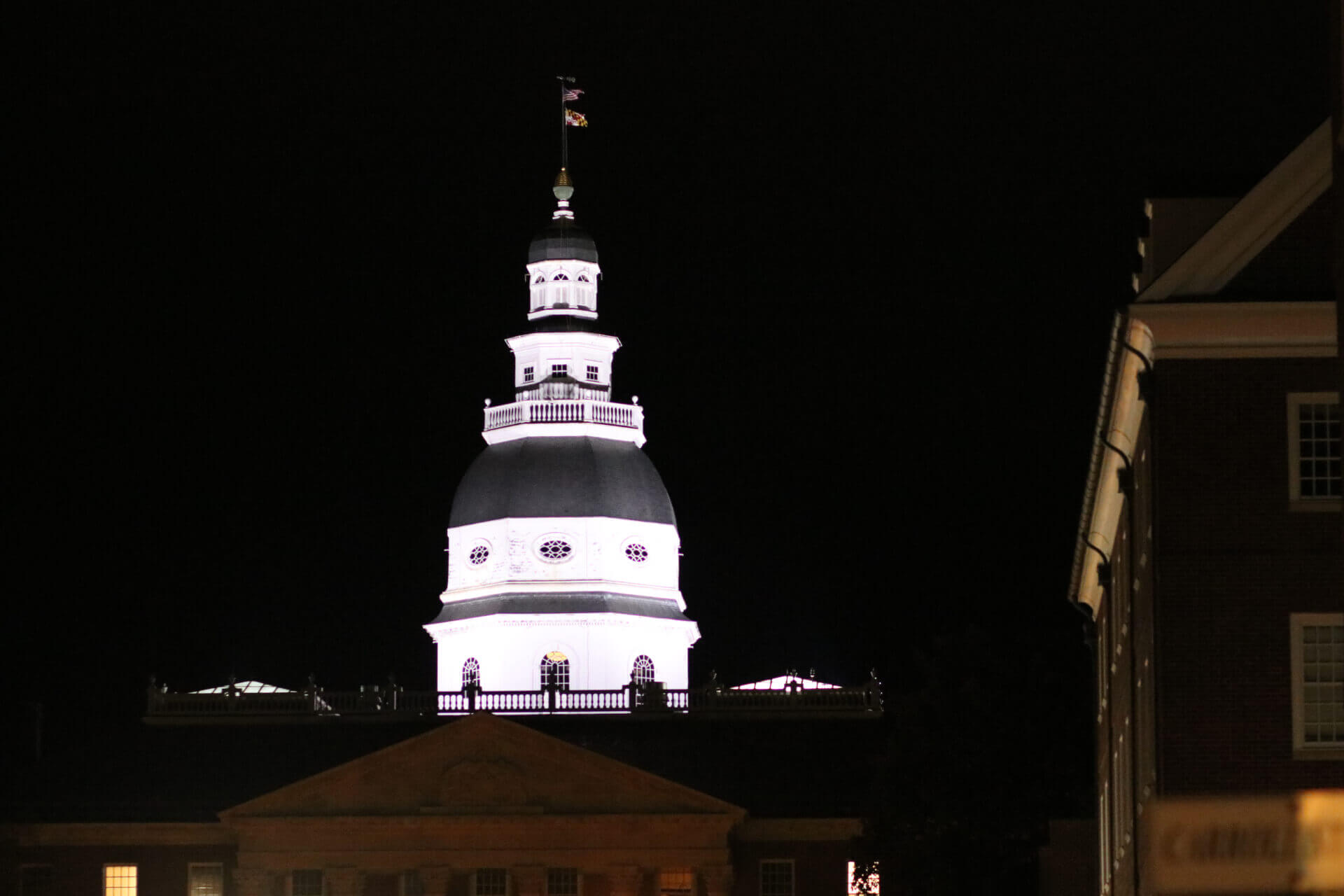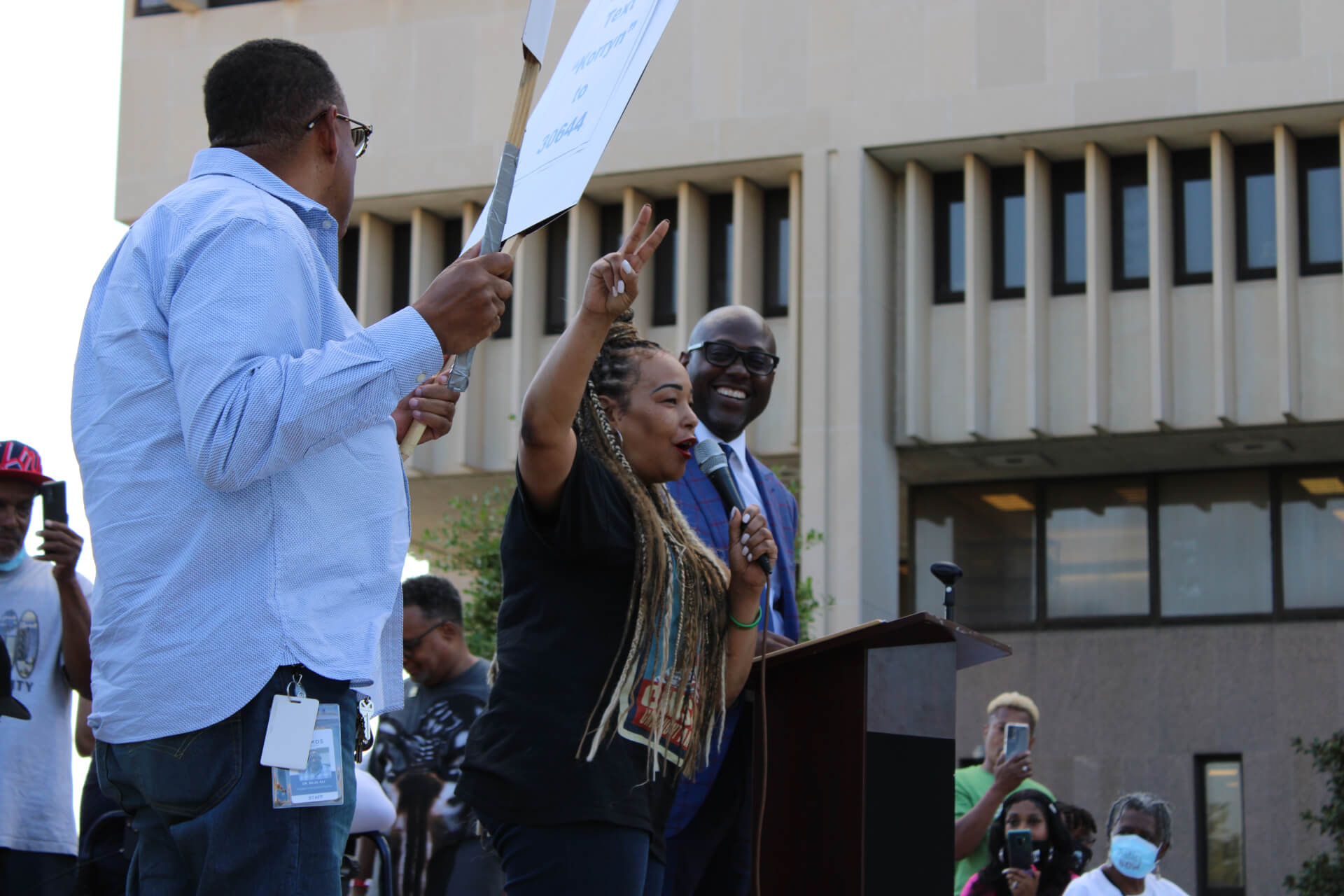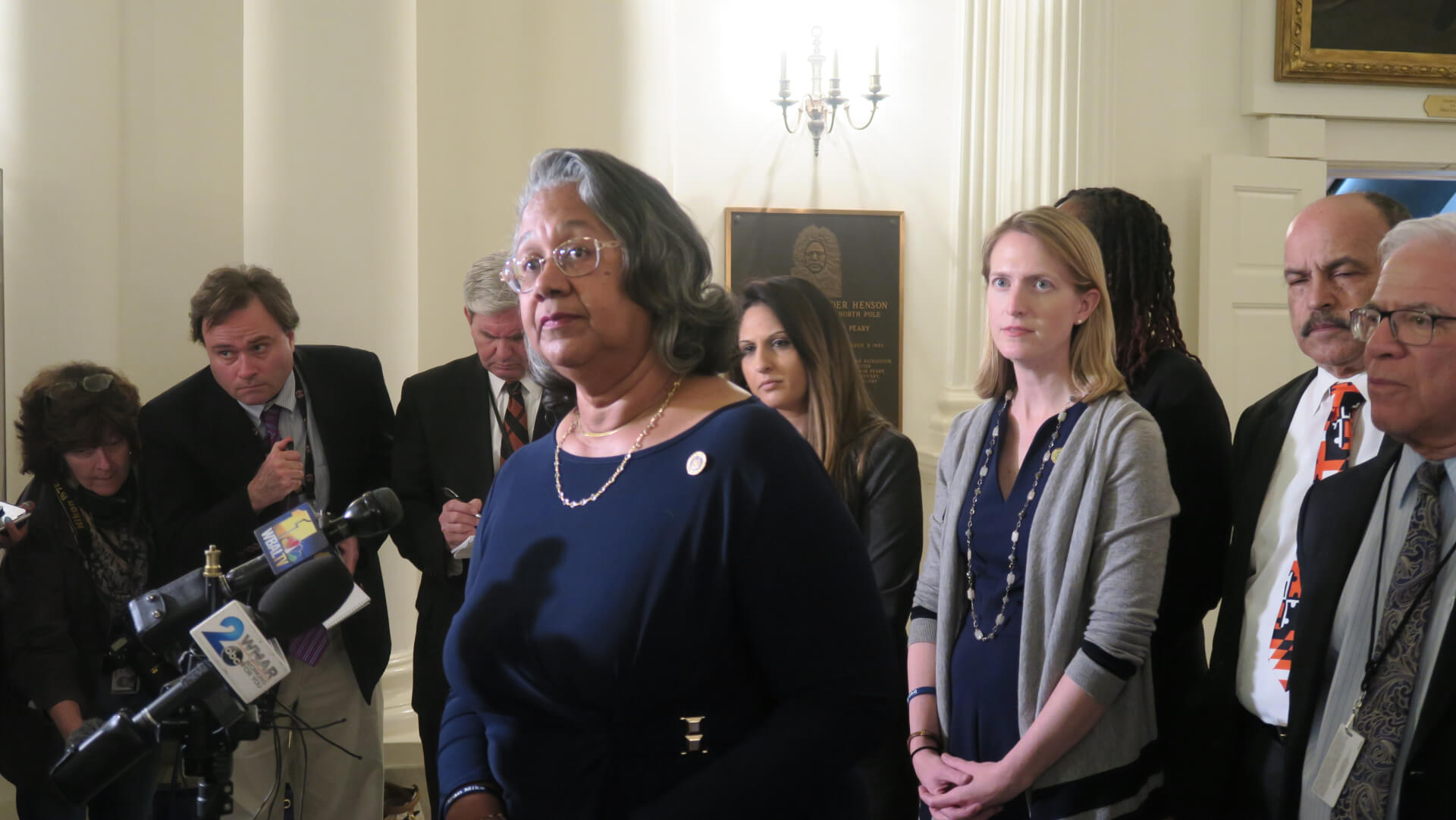Former Senator Oaks’ Bribery, Corruption Case Ends in 3 1/2-Year Prison Term

Nathaniel Thomas Oaks, the disgraced former Democratic state senator from West Baltimore’s 41st District, was sentenced to 42 months in federal prison Tuesday for taking $15,300 in bribes from an FBI undercover source in a political corruption probe.
Oaks, 71, was sentenced in Baltimore by U.S. District Court Judge Richard D. Bennett, who imposed a term less than the eight to 10 years recommended in the federal sentencing guidelines ― between the 18 months recommended by the defense and 60 months sought by prosecutors.
Earlier this year, on March 29, Oaks pleaded guilty before Bennett to two of 10 felony charges brought against him in a November indictment ― one count of wire fraud and one count of “honest services” wire fraud ― two hours after his resignation from the Maryland Senate became effective.
The charges grew out of a bribery scheme in which he took $15,300 from a “Mike Henley,” an FBI undercover source who posed as a Texas businessman interested in building apartments in Baltimore.  Former senator Nathaniel T. Oaks, right, in May. File Photo
Former senator Nathaniel T. Oaks, right, in May. File Photo
Bennett said Tuesday that the 42-month sentence he imposed would have been closer to the 18 months sought by the defense, were it not for the fact that Oaks “single-handedly knocked out a whole investigation” by the FBI, when he surreptitiously notified a target in the bail-bonds industry of the existence of a corruption probe.
That tip-off occurred after Oaks agreed to wear a body-wire for the government, once he was confronted by FBI agents about his own transgressions.
Throughout the hearing, Bennett repeatedly returned to the idea that Oaks intentionally sought to “undermine an investigation” by the FBI, by “reversing field” after first agreeing to cooperate with federal agents. He asked both defense and prosecution lawyers if they had ever heard of such a reversal in any case, saying that he had even asked his law clerk to research the same question.
“It is just dumbfounding to me,” said Bennett, clearly perturbed by the action. “It is beyond the pale – it goes beyond the pale.” “A good two years of this sentence is the obstruction of justice,” he said.
The judge also ordered Oaks to pay a fine of $30,000, plus a $200 special assessment, within 60 days. Oaks already was ordered last month by the court, at the urging of prosecutors, to forfeit $5,000 of the bribes he pleaded guilty to taking.
Oaks will remain free until he voluntarily reports to prison, likely the Federal Correctional Institution in Cumberland, on Sept. 17.
Upon completion of his 3½-year prison term, Oaks will be subject to three years of supervised release and must complete 80 hours of community service, Bennett said.
Oaks showed up in the courtroom just three minutes before the 11 a.m. sentencing hearing was to begin, wearing a light-brown, three-piece, summer-tweed suit and his matching trademark kufi, with a blue check shirt, tie and blue lizard-skin shoes.
During the two-hour hearing, Oaks occasionally huddled quietly with his federal public defenders, Lucius T. Outlaw III and Rebecca S. Talbott.
Kathleen O. Gavin, the assistant U.S. attorney who is chief of the Fraud and Public Corruption unit, presented the prosecution’s sentencing arguments, as Leo J. Wise, another assistant U.S. attorney in the case, and two FBI agents involved in the Oaks investigation, looked on from the prosecution table.
“Carefully corrupt,” Gavin began, standing at the podium between the prosecution and defense tables. “I think those words describe the defendant in this case.”
The prosecutor then painted a picture of Oaks as calculating and deliberate in all his illegal and ethically challenged actions, holding the people who catered to him – such as an unnamed lobbyist who put him up in posh Las Vegas hotels and picked up all but $25 of his tab – in contempt, behind their backs.
“This is a public official that did not have a lapse,” she said. “This was a way of life for defendant Nathaniel Oaks.”
Taking note of the outpouring of letters on Oaks’ behalf that were sent to the judge, detailing all the good things he did for the community, Gavin said, “They didn’t see the real Nathaniel Oaks.”
As a public official, working for the community “was his job,” she said. “That was what he was supposed to do.”
Like Bennett, Gavin seemed to zero in on Oaks’ “particularly egregious” example of an obstruction of justice, when he “knowingly and intentionally tipped off” a probe target while he was wearing the body-wire for the government “with the purpose of derailing the investigation.”
“The investigation was shut down,” she said.
“That’s the real Nat Oaks,” Gavin said. “He committed acts of fraud, deceit. He lied. He obstructed justice.”
In pushing for the five-year sentence, Gavin said it was “critically important to send a message” to the public that this behavior is unacceptable – particularly to those members of the community who believe that “all elected officials are on the take.”
Outlaw stayed at the defense table to deliver his arguments, but first calling a number of character witnesses who spoke on Oaks’ behalf.
Although the defense lawyers originally informed Bennett that the witnesses appearing for Oaks would include Del. C.T. Wilson (D-Charles County) and former state Sen. John A. Pica Jr. (D-Baltimore), now a lobbyist, neither man showed Tuesday. Former Del. Clarence “Tiger” Davis (D-Baltimore) led off for the defense, telling Bennett of the help that Oaks had brought through what he called “quiet, constructive engagement,” particularly in dealing with veterans issues and matters of racism in some state departments.
Given that Oaks is now 71, giving him a prison term would be “a death sentence,” Davis said.
“The community needs Nathaniel Oaks,” he said.
David Maurice Smallwood, a West Baltimore community activist who has run unsuccessfully for office, and then Vincent Robinson followed, echoing what they said was the need for Oaks in the community.
Del. Salima Siler Marriott, another West Baltimore Democrat who was later a deputy mayor, stepped forward to speak, taking the place of Pica. Marriott told the judge how Oaks’ family and hers had grown up together, first in Cherry Hill and then in Edmondson Village, where they eventually settled.
“His job as a legislator was not all that he did,” Marriott said. “He went far beyond his job.
“I just really want you to hear … he did so much more than that.” As she was winding down talking about Oaks, she mentioned that she thought “he was trapped,” a suggestion that drew a murmur in the courtroom and quiet mutterings of “yes” and “that’s right.”
At that point, however, Bennett abruptly stopped her.
“You’re out of bounds,” he told her. The judge then rather heatedly said that there was no evidence of an entrapment by the government and explained how the defense had the opportunity to put on such a case and did not.
Outlaw stepped in at that point and began his close, first saying that “we’re not trying to minimize” Oaks’ “criminal conduct.”
“He traded his office for money,” Outlaw acknowledged. But, he said, “you have to balance that with the rest of Mr. Oaks’ life.”
Outlaw took issue with prosecution’s assertion that the people who showed up in court and wrote letters on Oaks’ behalf “don’t know the real Nathaniel Oaks.”
“They know what he’s done – to say that they don’t know him, I take offense at that,” he said. “Everyone is more than their mistakes.”
He then showed a chart of public officials in and around Maryland who had been convicted of crimes of corruption and the sentences imposed on them.
“There will be another message sent if the court sentences Mr. Oaks to a longer sentence than some of these people,” Outlaw said.
Another round of quiet murmurs ran up and down the courtroom benches among Oaks’ supporters.
Bennett then questioned Outlaw about Oaks’ derailing the FBI investigation, saying that he “glossed over” that part of the case.
The judge said that of all the years he had sat in the chair as a prosecutor, as a defense attorney and finally, for the last 15 years, on the bench, he knew of no case in which a government witness “reversed field” as Oaks had done.
“I know none,” Bennett said. “I find it almost unprecedented.”
He then asked Outlaw if he knew of any cases, and the defense attorney mentioned a political corruption case in which the accused perjured himself on the stand.
“That’s excellent,” he said. “You’re an excellent advocate for your client and an excellent lawyer.”
But, Bennett hastily added, that perjury case was not comparable.
“The big question here is the obstruction of justice,” he said.
When given the chance to speak in court on his own behalf, Oaks stood and cleared his throat before apologizing to his family, constituents and “friends who came down” to the courthouse. He then trailed off and appeared to become emotional before stopping.
After the sentencing, surrounded by supporters, Oaks shook hands and talked briefly with his good friend, Larry Young, a radio talk-show host and former legislator who was voted out of the Maryland Senate for ethics violations and who sat through the proceeding Tuesday.
Just outside the courtroom, Oaks asked Young to call and “get the back room” at the Luna Del Sea Steak & Seafood Bistro on Pratt Street for the assembled supporters who filled the small courtroom to have lunch.
Oaks and his supporters then exited the fifth floor of the U.S. District Courthouse in Baltimore via the stairs down to the lobby.
The crux of the government’s case revolved around Oaks’ interactions with “Mike Henley.” In return for three payments totaling $15,300, Oaks twice used his General Assembly letterhead to falsely promote a “Henley” project to a U.S. Department of Housing and Urban Development official, another FBI front, unbeknownst to the lawmaker.
The third time, Oaks asked the Maryland Department of Legislative Services to draft a $250,000 bond bill for “Multi-Family Housing Development at Druid Park Lake” in the 2017 legislative session.
Henley had asked Oaks for the pre-filed bond bill so that he could show his bank he had political support for his housing project, he told the lawmaker.
Those activities took place before Oaks knew he was the focus of the federal probe, which he finally learned about Jan. 9, 2017, when confronted by FBI agents, who told him he had been under investigation for two years.
Oaks then agreed to wear a body wire and record his telephone calls for the government. In spring 2017, however, while he was supposed to be cooperating with federal investigators, he tipped off the bail-bonds target, known in court documents only as Person #1, to the existence of a corruption probe.
He was later charged in a superseding indictment in November with an additional felony count, obstruction of justice, stemming from the alleged tip-off.
Oaks was most recently a member of the House of Delegates for 22 years, until Feb. 10, 2017, when he was appointed to the Maryland Senate, replacing Lisa A. Gladden who resigned her seat due to health problems.
Earlier, Oaks also had been a member of the House of Delegates, first elected in 1982, but he was forced to forfeit his seat in 1989, after being convicted of theft charges related to double-billing his legislative expenses.
That conviction was changed in 1990, at his request, to probation before judgment by a Baltimore judge.




 Creative Commons Attribution
Creative Commons Attribution